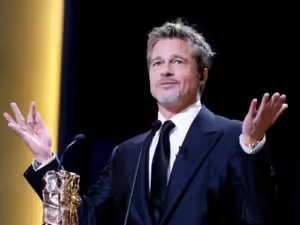
Will Smith’s Career
Will Smith is a name that resonates with movie lovers around the globe.
Known for his charm and versatility, he has starred in blockbuster films and beloved television series.
From his breakthrough role in The Fresh Prince of Bel-Air to iconic films like Independence Day and Men in Black, Smith has built a remarkable career in Hollywood.
However, one pivotal decision could have altered the trajectory of both his career and the film industry.
The Offer of a Lifetime: The Role of Neo in The Matrix
In the late 1990s, the Wachowskis were gearing up to release The Matrix, a film that would redefine the sci-fi genre.
The film’s innovative special effects and thought-provoking themes made it a groundbreaking project.
Before Keanu Reeves became the face of Neo, the role was offered to several A-list actors, including Will Smith.
At that time, Smith was riding high on the success of Independence Day and Men in Black, both of which solidified his status as a leading man.
Despite the allure of starring in what would become a multi-billion-dollar franchise, Smith turned down the role.
Smith’s Reasons for Declining the Role
Reflecting on his decision, Smith explained that he was hesitant to take on another alien-themed film.
He recalled, “I had done Independence Day the year before, so I was like, ‘Eh, I’m not doing another alien movie; I don’t want to be the alien movie guy.’”
When the Wachowskis pitched The Matrix, Smith found the concept hard to grasp.
He described it as “a hard movie to pitch,” noting that the idea of living in a computer simulation seemed too far-fetched at the time.
It wasn’t until he saw the finished film that he understood its brilliance.
The Road Not Taken: What Could Have Been
Will Smith was not the only actor to pass on the role of Neo.
Other stars like Brad Pitt, Leonardo DiCaprio, and Nicolas Cage also declined the opportunity, fearing the film’s ambitious vision would not resonate with audiences.
After several rejections, the role ultimately went to Keanu Reeves.
His portrayal of Neo became iconic, and the film went on to achieve monumental success, earning over $460 million worldwide.
In contrast, Smith’s choice to star in Wild Wild West was met with criticism, as the film underperformed at the box office, earning $222 million against a hefty $170 million budget.
The Impact of Will Smith as Neo
Imagining Will Smith as Neo opens up intriguing possibilities.
His charismatic and animated style could have brought a different energy to the character.
While Reeves’ portrayal became legendary, Smith’s version might have shifted the film’s tone and overall feel.
It’s fascinating to consider how Smith’s star power could have influenced the film’s reception and the trajectory of the franchise.
However, it’s important to recognize that Smith’s decision was based on the information he had at the time, and he could not have predicted the monumental impact of The Matrix.
Other Major Roles Will Smith Turned Down
Will Smith’s decision to pass on The Matrix is not an isolated incident.
Throughout his career, he has turned down several significant roles that could have changed his career path.
Here are a few notable examples:
- Superman in Superman Returns: Smith was considered for the role of Clark Kent but declined, fearing that taking on such an iconic character might alter the audience’s perception of him.
- Django in Django Unchained: Quentin Tarantino wrote the role of Django specifically for Smith, but he turned it down, feeling the story’s themes did not resonate with him.
- Jack Maine in A Star Is Born: Before Bradley Cooper took on the role, Smith was in talks for this pivotal character, which could have significantly impacted his career.
- Carter in Rush Hour: Smith was offered the role of Detective James Carter, which ultimately went to Chris Tucker, leading to a successful franchise.
- Phone Booth: Smith was considered for the lead role but turned it down due to a lack of compelling motivation for the villain.
- K-PAX: He declined the role of Prot, feeling disconnected from the character; Kevin Spacey eventually played it and received critical acclaim.
- Snake Eyes: Initially set to play Commander Kevin Dunne, Smith dropped out over a salary dispute.
These decisions create notable “what if” scenarios for Will Smith, each shaping his career and the films that followed.
Public Reaction to Smith’s Decision
The public reaction to Will Smith’s choice to decline the role of Neo has been a mix of curiosity, speculation, and some regret.
Curiosity About “What If” Scenarios
Fans and critics alike have often wondered how different The Matrix might have been if Smith had accepted the role.
His popularity at the time could have changed the film’s dynamics and possibly its reception.
Regret and Reflection from Smith
In various interviews, Smith has expressed some regret about his decision.
He admitted that he didn’t fully grasp the Wachowskis’ vision when they pitched the film, leading him to pass on what became a classic.
He humorously reflected that he might have “messed up” the film if he had taken on the role.
Criticism of His Choice
Smith’s decision has attracted criticism, especially since he chose to star in Wild Wild West, which received poor reviews.
Commentators often highlight this choice as a significant misstep in his career, raising questions about what could have been.
Impact on Hollywood’s Landscape
Smith’s decision not only influenced his career but also shaped Hollywood’s cultural landscape.
The Matrix became a landmark film, inspiring a generation of filmmakers and audiences.
Smith’s absence from the film brings up discussions about representation and casting choices in high-concept films during that era.
Acknowledgment of the Film’s Success
Despite any regrets, fans and industry insiders recognize that The Matrix thrived without Smith.
The film won multiple awards and is celebrated for its innovative storytelling and visual effects, further establishing Reeves as a leading actor.
Missed Opportunities: Major Roles Will Smith Turned Down That Could Have Altered His Career
Introduction: The Journey of Will Smith
Will Smith is one of the most recognizable and successful actors in Hollywood.
He is known for his unique blend of charisma, humor, and action.
From his early days on the hit television series The Fresh Prince of Bel-Air to iconic film roles in Independence Day, Men in Black, and The Pursuit of Happyness, Smith has captivated audiences worldwide.
However, his career could have taken several different paths had he accepted some key roles that he ultimately turned down.
In this blog post, we’ll explore some of these significant missed opportunities and how they might have changed the course of his career.
1. Neo in The Matrix
One of the most famous roles that Will Smith declined was Neo in The Matrix.
When the Wachowskis approached him with the project, Smith was already a rising star after his successes in the late 1990s.
However, Smith was hesitant about the film’s concept, which involved a complex narrative about a simulated reality.
He later explained that he did not want to be known only as “the alien movie guy” after his roles in Independence Day and Men in Black.
Instead of accepting the role, Smith chose to star in Wild Wild West, a decision that, in retrospect, many believe was a misstep.
The Matrix went on to become a groundbreaking film, redefining the sci-fi genre and launching a successful franchise, while Wild Wild West received poor reviews.
2. Django in Django Unchained
Another significant role Will Smith turned down was Django in Quentin Tarantino’s Django Unchained.
Tarantino specifically wrote this character with Smith in mind, envisioning him as the star of the film.
However, Smith declined the role, feeling that the themes of the story were too intense and did not resonate with his artistic vision.
He expressed concern that Christoph Waltz’s character overshadowed Django, which could have limited his starring presence.
The film ultimately received critical acclaim, and Jamie Foxx, who took on the role of Django, won several awards for his performance, leaving fans to wonder how Smith’s portrayal would have differed.
3. Superman in Superman Returns
Will Smith was also considered for the lead role of Clark Kent in Superman Returns.
At the time, Smith was wary about taking on such an iconic character, fearing that it might drastically change the audience’s perception of him.
He felt that after his role as a hero in Wild Wild West, stepping into Superman’s shoes would limit his range as an actor.
Ultimately, the role went to Brandon Routh, whose performance received mixed reviews, yet the film rekindled interest in the Superman franchise.
4. Jack Maine in A Star Is Born
Smith was in talks to play Jack Maine in the 2018 version of A Star Is Born.
This role eventually went to Bradley Cooper, who not only starred in the film but also directed it.
If Smith had accepted this role, it could have significantly impacted his career trajectory, potentially leading him to win awards for both acting and directing.
The film was a critical success and re-established the story of A Star Is Born, further solidifying Cooper’s status in Hollywood.
5. Carter in Rush Hour
Will Smith was offered the role of Detective James Carter in Rush Hour, which was ultimately played by Chris Tucker.
This franchise became a massive success, and Tucker’s portrayal of Carter is widely recognized.
Smith turned down the role, which many speculate could have added a new dynamic to the film series.
His energetic and charismatic style might have resulted in a different kind of chemistry with Jackie Chan, potentially reshaping the franchise’s identity.
6. Phone Booth
In Phone Booth, a film centered around a man trapped in a phone booth by a sniper, Smith was considered for the leading role.
However, he chose to decline the part, feeling there wasn’t enough motivation behind the story.
Colin Farrell eventually stepped in, and the film became a sleeper hit.
Had Smith taken the role, it may have showcased his dramatic talents in a more serious context.
7. K-PAX
Another intriguing role Smith passed on was in the 2001 film K-PAX.
The film featured Kevin Spacey as Prot, an enigmatic patient who claims to be an alien.
Will Smith felt disconnected from the character and ultimately decided not to pursue it.
Spacey received praise for his performance, which critics praised for bringing depth and complexity to the character.
It’s interesting to think how Smith’s charisma might have transformed the role and the film itself.
8. Snake Eyes
Initially, Will Smith was set to play Commander Kevin Dunne in Snake Eyes.
However, he withdrew from the project due to a salary dispute.
Gary Sinise eventually took over the role.
This decision surprised many fans, as the film became popular for its thrilling action sequences and plot twists.
Had Smith been involved, the film might have highlighted his action star appeal even further.
The Reflection of Career Choices
Will Smith’s decisions to turn down these various roles reveal a lot about his career strategy and personal values.
He has frequently emphasized the importance of choosing roles that resonate with him on a personal and artistic level.
While each decision could have led to a different career trajectory, Smith’s path has defined him as one of Hollywood’s most versatile actors.
His willingness to prioritize roles that align with his values has allowed him to remain relevant and respected in the entertainment industry.
The Matrix: A Landmark Film That Redefined the Sci-Fi Genre
Introduction: The Impact of The Matrix
Released in 1999, The Matrix is more than just a sci-fi movie; it is a cultural phenomenon that transformed the landscape of science fiction in Hollywood.
Directed by the Wachowskis, this groundbreaking film introduced audiences to a unique blend of action, philosophy, and innovative storytelling techniques.
It set new standards for visual effects and storytelling that would influence countless films and series in the years to come.
In this blog post, we will explore how The Matrix impacted the sci-fi genre and why it remains a cornerstone of modern cinema.
1. Innovative Special Effects
One of the most significant contributions of The Matrix to the film industry is its revolutionary special effects.
The film showcased groundbreaking technology like bullet time, which allows the camera to capture fast-moving actions while slowing down time.
This visual effect created stunning sequences that hadn’t been seen before and has since become a hallmark in action filmmaking.
Many films followed in its footsteps, attempting to replicate the iconic look and feel of The Matrix.
Movies like 300 and Inception adopted similar visual techniques, demonstrating the lasting influence of the film’s innovative effects.
The Use of Practical Effects
In addition to CGI, The Matrix cleverly utilized practical effects to enhance its realism.
The fight scenes were choreographed with precision, incorporating martial arts styles and wire-fu techniques that gave the protagonists an almost superhuman quality.
This commitment to realism in action sequences elevated the expectations of viewers and influenced how subsequent sci-fi and action films approached choreography.
2. Complex Storytelling and Themes
The Matrix is renowned for its complex narrative which delves into profound philosophical themes.
The exploration of reality versus illusion and the questions surrounding consciousness and free will provided viewers with much to ponder.
This depth of storytelling set a new benchmark in the genre, encouraging filmmakers to look beyond surface-level plots.
It paved the way for films like Inception and Interstellar, where complex narratives and philosophical explorations are central to the story.
The Blend of Genres
The Matrix also successfully blended various genres, including science fiction, action, and even cyberpunk.
By merging these elements, it appealed to a broader audience and demonstrated that genre boundaries could be crossed effectively.
This genre-blending inspired filmmakers to experiment with their narratives, resulting in innovative works that combine different themes and styles.
3. Redefining Action in Sci-Fi
The Matrix transformed how action sequences were perceived in sci-fi films.
It set a new standard for choreographed fight scenes, seamlessly integrating martial arts with the futuristic setting.
The intense and visually captivating action sequences set it apart from other films of the time and inspired a resurgence of interest in martial arts in mainstream cinema.
Subsequent films, such as the John Wick series, credit The Matrix as an important influence for its action and choreography.
The Role of “The One”
The character of Neo as “The One” introduced audiences to the notion of a chosen hero in a sci-fi context.
This archetype became popular in many subsequent films, where protagonists are often depicted as saviors of their worlds.
The Matrix not only featured spectacular action but also deepened the lore of its world, showing that action can serve a narrative purpose beyond mere entertainment.
4. Cultural Impact and a New Wave of Filmmaking
The cultural impact of The Matrix cannot be overstated.
It became a staple of pop culture, influencing fashion, language, and even technology discussions.
The film’s aesthetic, characterized by its dark colors and sleek costumes, has inspired countless parodies and homages across various media.
It also provoked philosophical discussions that extended beyond cinema, inviting audiences to question their understanding of reality.
Inspiration for New Creators
The Matrix opened the door for a new generation of filmmakers.
Many directors cite it as a major influence on their work, pushing boundaries of storytelling and technology.
Films and series created in the wake of The Matrix, such as Dark City and The Expanse, reflect the ambition and creativity it inspired.
5. Legacy in Future Sci-Fi Films and Series
The legacy of The Matrix continues to impact the sci-fi genre today.
With the release of its sequels, The Matrix Reloaded and The Matrix Revolutions, the franchise expanded its universe, introducing new concepts and characters.
Every new installment has continued to explore the philosophical underpinnings that made the original so intriguing.
Additionally, many modern films, including The Matrix Resurrections (2021), reflect not only the style but also the thematic depth of the original.
The Rise of Cyberpunk Aesthetics
The Matrix popularized the cyberpunk aesthetic in mainstream media.
Its influence can be seen in numerous films and series, including adaptations like Altered Carbon and Blade Runner 2049.
These works often draw inspiration from the original’s visual style and dystopian themes, demonstrating how The Matrix shaped the look and feel of contemporary science fiction.
The film showcased groundbreaking technology like bullet time, which allows the camera to capture fast-moving actions while slowing down time.
This visual effect created stunning sequences that hadn’t been seen before and has since become a hallmark in action filmmaking.
Many films followed in its footsteps, attempting to replicate the iconic look and feel of The Matrix.
Movies like 300 and Inception adopted similar visual techniques, demonstrating the lasting influence of the film’s innovative effects.
The Use of Practical Effects
In addition to CGI, The Matrix cleverly utilized practical effects to enhance its realism.
The fight scenes were choreographed with precision, incorporating martial arts styles and wire-fu techniques that gave the protagonists an almost superhuman quality.
This commitment to realism in action sequences elevated the expectations of viewers and influenced how subsequent sci-fi and action films approached choreography.
2. Complex Storytelling and Themes
The Matrix is renowned for its complex narrative which delves into profound philosophical themes.
The exploration of reality versus illusion and the questions surrounding consciousness and free will provided viewers with much to ponder.
This depth of storytelling set a new benchmark in the genre, encouraging filmmakers to look beyond surface-level plots.
It paved the way for films like Inception and Interstellar, where complex narratives and philosophical explorations are central to the story.
The Blend of Genres
The Matrix also successfully blended various genres, including science fiction, action, and even cyberpunk.
By merging these elements, it appealed to a broader audience and demonstrated that genre boundaries could be crossed effectively.
This genre-blending inspired filmmakers to experiment with their narratives, resulting in innovative works that combine different themes and styles.
3. Redefining Action in Sci-Fi
The Matrix transformed how action sequences were perceived in sci-fi films. It set a new standard for choreographed fight scenes, seamlessly integrating martial arts with the futuristic setting.
The intense and visually captivating action sequences set it apart from other films of the time and inspired a resurgence of interest in martial arts in mainstream cinema.
Subsequent films, such as the John Wick series, credit The Matrix as an important influence for its action and choreography.
The Role of “The One”
The character of Neo as “The One” introduced audiences to the notion of a chosen hero in a sci-fi context.
This archetype became popular in many subsequent films, where protagonists are often depicted as saviors of their worlds.
The Matrix not only featured spectacular action but also deepened the lore of its world, showing that action can serve a narrative purpose beyond mere entertainment.
4. Cultural Impact and a New Wave of Filmmaking
The cultural impact of The Matrix cannot be overstated.
It became a staple of pop culture, influencing fashion, language, and even technology discussions. The film’s aesthetic, characterized by its dark colors and sleek costumes, has inspired countless parodies and homages across various media.
It also provoked philosophical discussions that extended beyond cinema, inviting audiences to question their understanding of reality.
Inspiration for New Creators
The Matrix opened the door for a new generation of filmmakers.
Many directors cite it as a major influence on their work, pushing boundaries of storytelling and technology.
Films and series created in the wake of The Matrix, such as Dark City and The Expanse, reflect the ambition and creativity it inspired.
5. Legacy in Future Sci-Fi Films and Series
The legacy of The Matrix continues to impact the sci-fi genre today.
With the release of its sequels, The Matrix Reloaded and The Matrix Revolutions, the franchise expanded its universe, introducing new concepts and characters. Every new installment has continued to explore the philosophical underpinnings that made the original so intriguing.
Additionally, many modern films, including The Matrix Resurrections (2021), reflect not only the style but also the thematic depth of the original.
The Rise of Cyberpunk Aesthetics
The Matrix popularized the cyberpunk aesthetic in mainstream media.
Its influence can be seen in numerous films and series, including adaptations like Altered Carbon and Blade Runner 2049.
These works often draw inspiration from the original’s visual style and dystopian themes, demonstrating how The Matrix shaped the look and feel of contemporary science fiction.



















